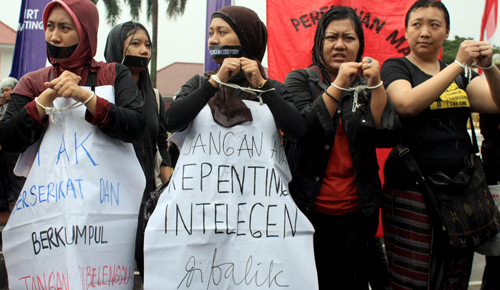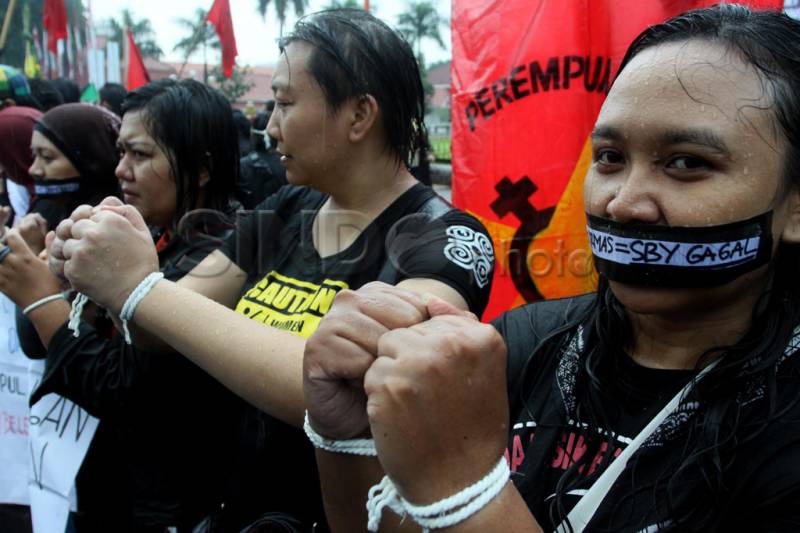The JASS-inspired organization of young women who share JASS’ mission, Forum Aktivis Perempuan Muda Indonesia (FAMM-Indonesia) has been at the center of the on-going protests against the Mass Organizations Bill, also known as the Ormas Bill, because it could easily be interpreted to restrict women’s organizations and other marginalized communities’ participation in public life.
Indonesian civil society is concerned about the Ormas Bill because it threatens to undermine freedom of association and expression. Attempting to replace the 1985 law of the same name, the new version grants the government new powers to disband organizations and monitor foreign associations more closely. It also stipulates that all organizations must be based on Pancasila ideology, the official philosophy of the Indonesian state from 1945, which emphasizes belief in one supreme God, humanitarianism, nationalism expressed in the unity of Indonesia, consultative democracy and social justice—all of which are open to interpretation.
Given steps taken and statements made by the current government to impose more control over civil society, the bill has citizen activists worried. Some say that the bill was initially drafted to limit the actions of fundamentalist religious organizations, particularly Islamic groups. However, over time the bill has evolved to encompass a number of organizations, which activists say is “anyone trying to speak up against the government.” According to Otto Nur Abdullah, chair of the National Commission on Human Rights (Komnas HAM), the lack of a clear definition of “mass groups” in the bill would enable the government to crack down on political dissidents by accusing them of contradicting Pancasila or opposing the Unitary State of the Republic of Indonesia.
Currently, both human rights activists and Muslim conservatives fear that the bill will revive the authoritarianism of former Indonesian President Suharto during the New Order era. If enacted into law, activists say that the bill would grant government excessive authority to control civil society groups and would eventually destroy democratic processes.
Since February 2013, protestors have been demonstrating in several regions and provinces of Indonesia, including the capital, Jakarta. On 12 April 2013, women from FAMM-Indonesia joined a protest rally in Surabaya, East Java with around 700 activists from organizations including, KontraS Surabaya, Samitra Abhaya KPPD, KPI Jatim, Muhammadiyah, GAYa NUSANTARA, and Dipayoni. Standing in solidarity, they chanted against the Ormas Bill:
“RUU Ormas = penindasan Orde Baru!” (The Ormas Bill is New Order Era Repression!”)
“Hati-hati kembalinya militerisme di balik ruu ormas!” (Beware of the return of militarism through the Ormas Bill!)
“Lawan RUU Ormas!” (Communities oppose the Ormas Bill!)
It began to rain heavily in the middle of the protest, but the young women only chanted louder with the police looking on in disbelief.
 Maria Mustika of JASS Southeast Asia and FAMM-Indonesia took part in the April 12 rally. She considers the halting of the deliberations a success, albeit temporary. The different social movements’ protests were successful in pressuring the Indonesian government. “When we started the simultaneous protests in several cities of the country, the representatives cancelled the draft ratification of the bill. Our united action was very effective,” she says.
Maria Mustika of JASS Southeast Asia and FAMM-Indonesia took part in the April 12 rally. She considers the halting of the deliberations a success, albeit temporary. The different social movements’ protests were successful in pressuring the Indonesian government. “When we started the simultaneous protests in several cities of the country, the representatives cancelled the draft ratification of the bill. Our united action was very effective,” she says.
FAMM-Indonesia Mobilizes
JASS-aligned activists have been holding discussions with journalist in eastern Java, educating local communities and mobilizing alliances in different ways to put a stop to repressive government policies such as the Ormas Bill.
Many women’s organizations support this movement because we have the same commitment to preventing a revival of the New Order era in our time. Many women friends support us by participating in our discussions, online and offline. They also contribute by sending us the latest information to pass on to others.” – Maria Mustika.
FAMM-Indonesia also makes the most of social media. Sulis and Habsari Safitri, active members of FAMM-Indonesia, explain, “We open pockets of discussion on Facebook, Twitter or our mailing list. We provide media kits in the form of images and slogans which are posted on Facebook and we also produce stickers that can be used on laptops or notebooks.”
Regional Momentum
JASS women of Southeast Asia are always right at the heart of protests against repressive legislation or any move by governments to shrink democratic space.” – Kunthea Chan, JASS Southeast Asia’s Program Coordinator.
Last year, the women involved in JASS’ network in the Philippines participated in creative campaigns and mobilizations to thwart the implementation of the cybercrime law— a law that is purportedly designed to provide protection for women victims of cybercrime, but contains additional provisions that endanger freedom of expression, especially on the internet. Women active in JASS processes in Malaysia also expressed their opposition to the Section 114 Amendment, which, much like similar legislation in the region, masks limitations on rights and democracy behind a façade of protection.
“The struggle is far from over,” said Maria Mustika while speaking in Indonesia in June 2013. “The Ormas draft legislation will be passed if we do not remain vigilant. And if we don’t protest and the bill gets passed into law, we may not have the chance to hold another peaceful assembly in the future.”
Photo Credit: www.sindonews.com


























